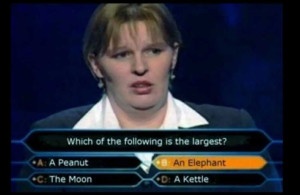When you’re walking the dog, should you wear a pair of shorts and a t-shirt? Or will you opt for woolly mittens and a scarf?
Whilst these are important matters, it’s not just these decisions that the tilt in the Earth’s axis has an influence on. Because of seasonal changes, paid search marketers need to work all-year-round to optimise their campaigns so they can take advantage of shifting (but generally predictable) buyer behaviour.
Spring, summer, autumn, winter – and let’s throw in Christmas, school holidays and Black Friday into the mix.
They all provide paid search experts with challenges: understanding peaks and troughs of their audience’s interest, figuring out how this affects their objectives, and how to budget accordingly.
They must think about when it’s the best time to position adverts in front of customers and what the copy in those ads (created on Google AdWords) should say. Relevance is everything in the land of PPC.{{cta(‘31375585-440e-4f24-8cbd-8cab96ed8e21’)}}
Because of this, it’s vital for professionals in charge of pay-per-click (PPC) campaigns to be completely familiar with their product – or holidays in the case of this post – and be aware of which time of the year people are searching online and looking for their services.
They have to be prepared in advance for seasonal consumer trends if they want to remain competitive in their industry – in fact, seasonality is the most important factor to impact PPC budgets, bidding, and conversion rates.
1. Your audience: are there any long term trends?
The first thing any PPC executive needs to do is to analyse the historical data they have at their disposal.
So, for the sake of this post, let’s pretend we’re selling Ibiza holidays. It could be flights, hotels or club tickets – but before we begin we need to know when there are high levels of interest in the product.
The first graph is from Google Keyword Planner, a free tool that every PPC executive uses – it shows there’s a substantial drop off in the number of people searching for ‘Ibiza Flights’ between October and December, which, not so coincidentally, happens to be straight after the annual closing parties of all the big clubs such as Amnesia, DC10 etc.
But, after the New Year and when January comes around, people begin to search again. It’s the time of year when big plans come together and there’s a little bit of cash left over from relatives’ Christmas cards.
The search volume then creeps slowly upwards – although it remained static in 2015 – throughout the year until presumably it dropped off again in September. Like we said at the beginning of the post, consumer behaviour is predictable – PPC advertisers should take note of this.
The second graph is from Google Trends, which is another free tool available to anyone. It shows a near enough exact correlation with the graph above – but what does this mean for marketers?
2. Traffic or conversions: what are your objectives?
What you do with the historical data you gather depends on the goals you set, and these objectives depend on your audience and the time of year. To really market your ads effectively and get the most from your budget, you need to understand the customer journey and the ways consumers move through the purchase funnel: from awareness of a brand, to developing interest, the consideration stage, and eventual conversion.
PPC goals should be realistic, and relevant to your brand. They’re usually:
• Increasing web traffic
• Increasing conversions
To complete the above, highly targeted ads are required, which we’ve covered with some visual examples below.
Relevant ads target to highly specific people. They contain different headlines, copy and calls to action, along with specific landing pages that provide a clear conversion path – for all conversion-related work, you need a conversion rate optimiser. There’s more of that in our CRO-specific blog.
Continuing with our Ibiza example, consumers who’re looking at Ibiza holidays in December – which is admittedly a much lower volume than other times of the year – won’t be as far down the purchase funnel as budding travellers who’re searching for flights and accommodation in September.
A little taster of what you could expect at a poolside party in Ibiza
This means your message must change accordingly. Here we look at three different seasons – and recalling the Keyword Planner and when people are searching for ‘Ibiza Holidays’, have created three different paid ads.
This is the discovery phase, and not the time of year to be targeting people with ‘Last Minute Deal’ ads. At this time of year you’ve more time to make those sales targets, so something such as: ‘Find flights for summer 2016’ is much more appropriate – or ‘Get Your 2016 Holiday Plans Sorted’.
Only in January – when search volumes increase and people are planning their yearly holidays – should your copy be pushier.
Ibiza holiday season is now in full swing and the clubs on the island are busy with revellers enjoying the music and the special hedonism of the Balearic’s most famous isle.
Your ad copy should reflect this. It’s more of a decision-making time of year, and also the month when the search volume makes its yearly rise.
October marks the end of the main Ibiza clubbing season, and it’s a time when many people look to travel on last-minute plans.
This means that people will be hastier when looking to buy. They will be looking for a quicker resolution to their purchase – even speedier than the consumers searching in June – so your messages will reflect that.
Something like ‘Look at our range of flights’ will be replaced by ‘Book now for the closing parties’, because there’s much less time for deliberation, and an actionable message – perhaps even a ‘Buy now’ extension would be more relevant and applicable than it would be in December.
Extensions are available to improve your adverts and hopefully improve your click throughs, while A/B testing helps you experiment with different copy to see what’s working and what’s not.
3. The bidding process: how big is your budget?
Of course, it costs money to be directly visible via paid search advertising. However, like anything that involves cash, it’s possible to budget accordingly. In the case of paid search, you are able to closely manage your bids to hopefully deliver ROI – after all, you’ll have a finite amount to spend.
An idiot’s guide to PPC click costs
So, as a pay-per-click advertiser, you’ll be bidding against other advertisers, with marketers putting a maximum bid in, and the payment being an automated transaction when a click is made.
Click costs vary depending on your budget , products, competition, and what you want to achieve, and while there are no bad keywords to bid on, there are bad bids. When you are calculating how much you want to bid to get your ads in front of the right people on search engines, think about:
- What you want to bid on
- When you want to bid
- How much you want to bid
Try to find the balance between cost and the volume of high-quality traffic – there’s no point bidding on the right keywords at the wrong time, and vice-versa. If your ads aren’t relevant, you’ll either get too many clicks on irrelevant visitors, or you’ll exhaust your budget. There are a couple of basic bidding models to consider:
1. Budgeting according to your different products or services
This is a great option for first-time paid advertisers, and perhaps the most simple. With this model, you create separate bidding strategies for each product line and budget accordingly. This is the easiest paid search strategy to monitor.
AdWords allows you to set up a monthly budget cap for shared campaigns that all run simultaneously under one larger budget – just in case you’re advertising Ibiza hotels as well as flights.
2. Budget by your desired conversion
This is the best option if your website has multiple conversion goals, such as newsletter subscriptions, ‘contact us’ forms and purchases. It allows you to group keywords by conversion type and into separate campaigns – the only issue here is different keywords overlapping.
Alternatively, you could run the same keywords across the campaign. However, in this instance, you could use day parting options to focus spend on a different, custom landing page depending on the time of day.
A general rule is that weekends see less search traffic than weekdays – so save perhaps 80% of your budget for Monday-Friday, but remember that this is a general rule – you’ll know if it’s relevant to you by looking at search trends and by completely understanding your products and services.
Mornings, evenings and weekends are perhaps the right time to advertise to what we might assume is a younger demographic searching for holidays to Ibiza.
Need help with PPC?
Learn how to create a cost effective, highly targeted PPC campaign with our half-day training course. Complete the form below and one of our team will be in touch, or visit our Google AdWords training page to find out more.
Header image created by Luke Price








